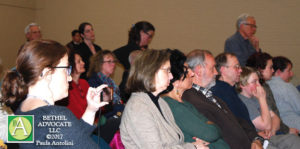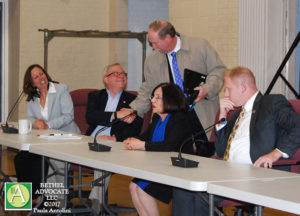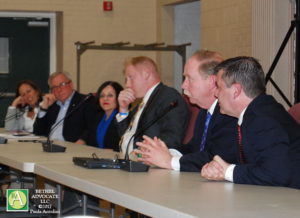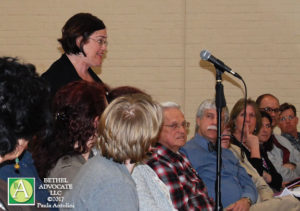
Report by Paula Antolini
April 26, 5:55AM EDT
Photo: On the panel of the Legislative Town Hall Meeting and State Budget Update on April 25, 2017, were (left to right) CT State Representative Stephen Harding, CT State Representative William Duff, Bethel First Selectman Matthew Knickerbocker, CT State Senator Toni Boucher, and CT State Senator Michael Mclachlan. (Not pictured, Dr. Christine Carver, Superintendent of Bethel Public Schools, who was also sitting on panel.) Click on all photos to view larger.
‘We’re broke and we’ve got to figure out a way to stop spending’ – Sen. McLachlan, at Bethel Legislators Town Hall Meeting and State Budget Update, April 25th
State Budget Did Not Pass
After a hard day of negotiation at the state capitol, a $41 billion CT state budget proposal was not adopted by the General Assembly’s Appropriations Committee yesterday.
Two local Connecticut state senators and two representatives hosted last night’s Legislative Town Hall Meeting and State Budget Update in Bethel, that was held in the General Purpose Room of the CJH Municipal Center at 7-8:30 p.m. About 70 people attended the meeting, despite the rainy weather that possibly kept some away. However, many people lined up to give comment on various topics, so the meeting ran overtime, until approximately 9:00 p.m.
Photo: People on line to give comment at the town meeting.
Thank you to Senator Michael McLachlan, Senator Toni Boucher, Representative Steve Harding, and Representative William Duff for providing us with so much input. Bethel Public Schools Superintendent Dr. Christine Carver and Bethel First Selectman Matt Knickerbocker were also on the panel to answer any questions and provide information.
Photo: On the panel of the Legislative Town Hall Meeting and State Budget Update on April 25, 2017, were (left to right) Dr. Christine Carver, Superintendent of Bethel Public Schools, Bethel First Selectman Matthew Knickerbocker, CT State Senator Toni Boucher, CT State Representative Stephen Harding, CT State Senator Michael Mclachlan and CT State Representative William Duff.
Senator Michael McLachlan said, “Today was an eventful day at the capitol in that the Appropriations Committee did not pass budget.”
“So that tells us unfortunately that this budget process just may drag on into the summer months. I’m still hopeful that we’ll be able to pull something off,” McLachlan said.
Sen. McLachlan described the negotiation process. “They did, to their credit, negotiate up until the very last minute … the leadership of the Appropriations Committee went off into a negotiations session to try and pull together areas of agreement. I was hearing as late as 2 o’clock in the afternoon that they were close, they were very close on a lot of things, but unfortunately at 5 o’clock we found out it fell apart,” McLachlan said.
“So, frustrating, yet that is the legislative process, that requires agreement, it requires some areas of disagreement, and areas that people can agree to disagree, and unfortunately today they did not pass the budget,” he said.
“That doesn’t mean we’re not going to see one. Tomorrow we were scheduled to pass a tax package in the budget. We had a public hearing today that was, frankly, very frustrating, because all they talked about all day long was raising more taxes,” McLachlan said. “So, you can’t do that, I’m sorry.”
McLachlan continued, as he described what believes people want. “I know there are people in this room that want more money for schools, more money for this building or more money for roads. Unfortunately in the State of Connecticut we’re broke and we’ve got to figure out a way to stop spending the way we are today, so that we can provide more services, which is, for government in Connecticut, number one, education, number two, public safety, three, transportation, and not least important, taking care of special needs population.”
So having said that, we’ve got much work to do yet,” McLachlan said. “Our Legislative Session is supposed to end on June 4th, that’s when the bell rings at midnight on June 4th. I am hopeful that much will occur over the next several weeks to get a budget back on track. The Republican Caucus will introduce a budget either Thursday or Friday which will have a balanced budget with full funding of local schools.”
“I remain optimistic that we are still yet to agree on a budget that will be best for the State of Connecticut without the dramatic tax increases that were discussed at a public hearing today in the Finance, Revenue and Bonding Committee,” McLachlan said.
Photo: Senator McLachlan speaking at town meeting.
*****
Regarding the state budget, Representative Stephen Harding said, “I think a lot of you have heard the news in regards to what the governor proposed, I don’t think any of us up here on the stage agrees with what the governor proposed. With that said, I don’t want to make it a partisan night tonight.”
He’s dealing with a very difficult task,” Harding continued, “We’re facing a 1.9 billion dollar deficit, and so there’s a lot of things here that we’re going to have to find money to cut, which is not an easy thing, because we have to have instructions about cutting vital services and programs to the people in the state of Connecticut, which is a tough pill to swallow, or we have to talk about raising taxes which is also an even tougher pill to swallow, in my opinion.”
“So, neither option is good, and when it comes down to that you get budgets that are proposed that are not very well-liked by anybody in the state of Connecticut,” Harding said.
*****
Representative William Duff said he felt most of the questions would be directed to other legislators, due to them being on committees that dealt with budget topics. “This is a great opportunity for us to hear from you, your concerns, how life is going, and how government is either interfering or promoting the quality of life you are chasing. Please feel free to stand up and comment.”
*****
Question from male audience member: What are you going to do for special needs students who are in a transitional period, age 18 to 21, what are you going to do to provide better funding for them, better education, and particularly for the ones who are in the bottom autistic. A lot of them need residential programs, they need more than just the four hours a day … social aspects … I am wondering what you are doing now?
Senator Toni Boucher answered, ” I am happy to hear you brought that question up. It is part of the budget negotiation. There’s not a question that that population has serious needs to be addressed. There is a waiting list for a lot of individuals that reach the age of 21. We’re still obligated, by the way, to serve those students up to the age of 21, but after that point of time we do have issues and there’s a long waiting list for families that are looking for good placement in group homes.”
“We’re trying very hard at least making sure part of our budget will be around making sure we fund the non-profit organizations like Ability Beyond Disability. In this other part of our region we have the STARR organization that does similar training and day programs and so forth, that really will help to transition those students into the mainstream and may be able to take on jobs and be able to be self-sufficient which is what the goal really is,” Boucher said.
“For those that are more impacted, we do have an issue, particularly as it involves the Southbury Training School population that is there, that is costing a great deal of money that many would like transitioned out to be able to use those funds that are currently spent, for more group homes or placement more in the community which is the more ideal situation,” Boucher said, “It is something we are discussing right now and a part of the budget process.”
Representative Harding commented, “The first thing we need to do is to address the excess cost. That involves educating these particular students in their years at Bethel schools. So as of now, the state should be obligated to pay 100% of excess cost … if the student is over a certain amount per pupil, over that amount, the State of Connecticut is obligated to pay that amount of money over that average pupil that has some special needs. Right now we’re paying about 75% reimbursement.”
Dr. Christine Carver said Bethel schools budgets 73 to 75% “because we anticipate that we are not going to get the full revenue.”
“I don’t think that totally addresses your question sir, that really refers to the school program,” Carver said.
The gentleman in the audience (did not give name) that asked the question originally, replied, “What the school district is doing with the kids in the 18-21 group, who need, you know, additional services and education, I know it’s expensive and there ought to be a way to cut the cost, but the fact is, the students are not getting served. The money is going elsewhere. It’s going to lawyers, psychologists, it’s going to all sorts of other expenses and the kids get nothing.”
Carver said, “I have to say here in Bethel am very proud of our program for 18-21-year-old students. We actually transitioned the program and it’s actually here at the Municipal Center this year for the most part, and we completely centered on developing job skills and vocational independent living skills as well as to continue to work on some of the poor academics. So those students are in job placements across the community, too numerous to even mention, where they work with job coaches, directly addressing their IEP, Individualized Education Plan goals objectives. In addition to that we do social skills, provide speech and language services that’s appropriate, physical therapy, occupational therapy, with a whole goal of trying to create as much independence as possible, so that when families have to make the decision about what’s that next step after age 21, that they have options.”
“We also work very closely with state agencies,” Carver said, “whether it’s the Department of Disabilities services, or Department of Mental Health Indication services, all of those agencies come together. Sometimes the Department of Children and Families, to really pla appropriately for those students. We’ve really formed, it’s a credit to this community, formed a lot of partnerships with a lot of different businesses to make that happen.”
Rep. Harding said he felt the non-profit agencies need to remain involved. “The excess cost, as Dr. Carver stated correctly, really involves for the most part, students under the age of 18 in the current school system. What I think we need to do for the 18-21 demographic is we need to empower the 501(c)(3), the non-profit organizations such as Ability Beyond, get them into these programs with these students, because really they’re the key resource to allowing them opportunities to find work, to using DDS and DSS, to get some state benefits, and so we’re a collaborative effort that needs to be involved, an that’s crucial to getting the non-profit agencies involved.”
Sen. Mclachlan said, “One other point about the group homes and the waiting lists. There has been a study done that we may need to build as many as 150 group homes in Connecticut at a cost of somewhere about $1.5 million each for the average number of residents of those group homes, and there are multiple problems, not only in the cost of the group homes, the cost of the employees to run the group homes, and the location of the group homes. There are some communities that are not necessarily friendly to, their zoning is not friendly to, group homes, construction and development, so that’s a multiple challenging thing to deal with when it comes to placement of the waiting list for group homes. Financial, location, staffing and time.”
*****
Question asked by audience member Ms. Kleary: Are each of the state agencies’ and departments budgets being cut of a certain percentage in this new budget? (meaning are there the same cuts across the board to all agencies and departments, Harding clarified).
Sen. Boucher said only one budget has been brought forth so far, the governor’s budget. “Essentially it cut schools, it cut towns, pushed down all sorts of pension payments that the state has been paying since 1970, to communities, and speaking about the education formula that the governor proposed, at the Education Committee we changed it all back, at least coming out of that committee, and many of the proposals. But there’s no formal proposal yet on the Democratic side, the majority Democratic side, or the Republicans. They will possibly be rolled out, possibly even this week, to have an alternative. But the governor des have a 5% rescission capability without taking from the legislature, just using his own executive power.”
Rep.Harding added, “To answer your question specifically that you asked before, was there a straight cut across the board, of departments? No. The cuts were staggered depending on what department, there was no 5% across the board.” Harding added, “I don’t know if every single department received some sort kind cut. I would assume, if I had to look at the budget, that it was a small amount to almost every single department and some larger amounts to others, so I would assume that most of them had a reduction but I don’t think every single department had a reduction.”
*****
Another question and comment came from Ms. Kleary. The issue of the the Department of Transportation (DOT) and new traffic lights installation at Taylor Road and Route 302 intersection was brought up by Ms. Kleary, mentioning that there were “about ten traffic lights which was unbelievably overdue in my opinion and a terrible waste of taxpayer dollars.” She added, “if it comes from regulations and rules, well it needs to be changed.”
Looking at First Selectman Knickerbocker, Sen. McLachlan said, “You are aware, you had to write at least a dozen letters, I think, to get their attention. It took a long time to get that traffic light done.”
“You’re talking about the signal at that intersection,” McLachlan said, addressing Ms. Kleary. “I remember the pushback from the DOT when we first asked about it was that it was a very difficult intersection to put a traffic light. We said that’s exactly why we need a traffic light. It’s a very difficult intersection, its not safe. So they went way beyond what a typical intersection called for, with all the extra electronics and so on.”
*****
Photo: Teacher Kim Romaro giving comment.
An audience member, Kim Romaro, labeling herself a taxpayer, parent and teacher, directing her comment to Sen. Boucher who represents the district in which she teaches, made a long statement praising teachers and the Bethel school system, and said, in part, “I’ve been worried about how the governor has shifted the teacher pensions on to the town. In my opinion it is pitting the taxpayers against the teachers in the town, and the teachers outside of the town. But in general, for example, in multiple towns they have posted the teacher’s salaries with an amount and teacher’s name next to it, saying the teachers are overpaid. This didn’t happen before the governor decided to do this. But I believe this is in direct relation to the governor deciding to put the pensions on to the towns and it’s not fair to the taxpayers to put it on to the towns. It pits those people in the town that work so hard. I know, Mr. Harding, that your wife works here. The teachers I’ve worked with in this town are amazing. The teachers I’ve worked with in the districts you support are amazing. We have the most amazing teachers in Connecticut.” (applause)
Romaro continued, “I’m really concerned about Bethel losing their funding, other towns as well, but particularly since I am a taxpayer in Bethel. At one of the town meetings it was shared that Bethel is the 4th poorest district in Fairfield County. Now we all think of Fairfield County as being a rich district. Okay we have Bridgeport which is not, and we have other towns around it … Stamford is going to be receiving more money than we are. That’s not fair. I understand Governor Malloy is from Stamford, however if Stamford makes more money and has more tax base to that’s not fair to Bethel just because we’re very good at teaching, very good at making that progress narrow, to take away Bethel’s funding. So when you go back to the state it’s very important to look at the fairness of it. It’s not fair to Bethel just because we appear to e very good in our school system. Our teachers are great. It is not fair to take our funding away just because maybe another district is a favorite, or is something where they’re able to use more money. We’re doing more on less already. I just don’t think it’s fair to Bethel.
Sen. Boucher replied to Ms. Romaro, “You are so passionate an thank you for everything you described. You haveto understand that the only reason I dip my toes into any political position at all was for my passion for education. There is no question that the role of teacher is as the most important job in our society. They’re literally producing the next generation of our population, and in a very technologically advanced world and obviously more critical than ever before.”
Boucher said, “Just be aware that the governor’s budget that you are taking about, the governor’s CTS plan, and that pushing down of the teacher’s pension into communities, that by the way, have done all the proper things, hard work on the part of the town and the school systems, to reform pensions, right? To convert them to find other distribution plans and benefits.”
“I have a family member that’s a teacher and they have to pay 6%, ad spend it on $4,000 before they even get any health care at all,” Boucher said. “I hope they’re listening here in the Senate when we talk about this because they have the ability to renegotiate some of this. So they haven’t done any of those things that the towns have done, and you try to build up a rainy day reserve fund. The state has spent down the rainy day fund. They are in a very precarious situation with very little left in it, and now they’re forcing even more costs down to municipalities who have done the hard work, the state hasn’t even begun to do. And if they were to do that we would be saving $2-3 billion and close the budget gap without any of these taxes.”
Boucher said, “Luckily, both sides of the political isle, in the Legislature, not the Governor’s office but the Legislature, are opposed to that in that it’s not going to go. Remember, Presidents and Governors propose, Legislatures and Congress dispose, make the decisions on behalf of the residents, which is a very good checks and balance. So we’re in the process of formulating budgets that do restore quite a bit of budget for towns like Bethel, hat by the way, you’re actually right, that they have the greatest growth and improvement in their education and instruction. That’s really important to know, closing the achievement gap, as you said. We are fighting hard for that, you can be sure, at the end of the day, whether we are able to get this passed on June 7th, or in the summer, or as some have suggested, maybe October. Nevertheless we are going to be fighting for our towns and hoping and suggesting that the state make the reforms necessary to close that gap instead of burden the public more.”
*****
There were many more questions asked by the public. Please check back shortly for PART 2 of our story, including coments from Bethel Board of Education Chairman Lawrence Craybas, more photos, and our full-length video of the town meeting.
###








Leave a Reply